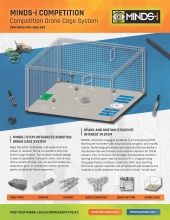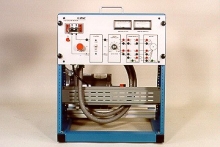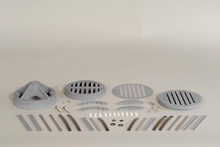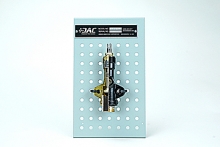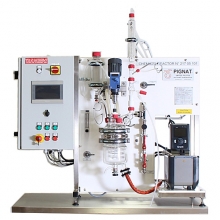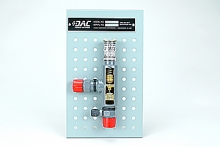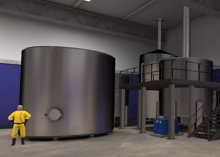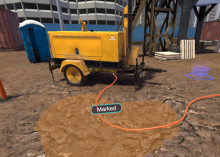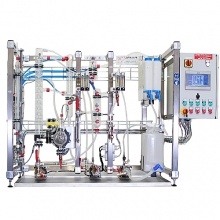Absorption processes are critical in gas-liquid operations where a component from a gas phase is transferred into a liquid solvent. Commonly used in environmental control (e.g., CO₂ capture) and chemical production, these systems help study parameters such as gas solubility, contact efficiency, and column dynamics. Educational units like Pignat’s ABS/100 and ABS/2000 provide hands-on training in both manual and automated gas absorption processes, reinforcing understanding through transparent components and real-time instrumentation.
Adsorption is a surface-based separation technique in which molecules from a fluid phase adhere to a solid surface, often used for purification, drying, and environmental applications. With units like ADM/2000 and ADS/2000, learners can explore gas-solid and liquid-solid adsorption in lab and pilot scales. These systems support detailed study of breakthrough curves, isotherms, and regeneration cycles, making them ideal for chemical engineering and process technology programs.
Crystallization is a key method for purifying solid compounds from liquids and is widely used in pharmaceuticals, food processing, and chemical manufacturing. Pignat’s CRA/100 and CRA/200 systems enable the study of both batch and continuous crystallization. These units support investigation into cooling and evaporation methods, crystal size distribution, and process optimization—ideal for demonstrating real-world industrial separation techniques in an academic setting.
Distillation is a fundamental separation technique that exploits differences in boiling points to purify or fractionate chemical mixtures. Pignat’s product line ranges from lab-scale DVI/100 and DVI/300 mini units to advanced pilot-scale DVI/6000 systems. These solutions cover essential concepts like mass and energy balances, reflux ratios, thermosiphon reboilers, and differential pressure monitoring, preparing students and professionals for real-world industrial distillation operations.
An ebulliometer is used to determine the boiling point of liquids and study vapor-liquid equilibrium, a core topic in thermodynamics. Pignat’s EEA/1000 and EEA/2000 ebulliometers allow for both manual and automated experiments, supporting instruction in azeotrope formation, Raoult’s Law, and boiling point elevation. These compact units serve as vital tools in chemical engineering labs focusing on phase equilibrium and fluid properties.
Liquid-liquid extraction is a separation method used to isolate compounds based on solubility differences in two immiscible liquids. Pignat’s ELA/100 and ELA/3000 stirred extraction units, along with the ELM/2000 mixer-settler system, allow learners to explore batch and continuous extraction processes. These systems are ideal for studying partition coefficients, emulsion formation, and separation efficiency in pharmaceutical, food, and chemical industries.
Evaporation is essential for concentrating solutions by removing solvents, typically water, through thermal energy. Pignat offers both simple (EVV/100) and multiple-effect (EVV/1000, EVV/2000) evaporators to demonstrate core concepts like heat transfer, boiling point elevation, and energy savings through effect cascading. These units are ideal for exploring process efficiencies and the design considerations found in food processing and chemical production.
Filtration is a solid-liquid separation process that is foundational in industries such as pharmaceuticals, water treatment, and chemical manufacturing. Pignat’s FSP/3000, FIL/2000, and FIP/2000 units offer varied filtration methods and study parameters such as flow rate, cake resistance, and filter media selection. These systems enhance student comprehension of industrial-scale separation challenges while maintaining hands-on laboratory relevance.
Chemical reaction systems provide students with practical experience in kinetics, reactor design, and process control. Pignat’s REA/2000 and REA/3000 reactors offer both basic and computerized training platforms to investigate isothermal and non-isothermal reactions. These units are designed to demonstrate fundamental reaction engineering principles, including residence time distribution, catalyst behavior, and heat effects, preparing learners for diverse applications in chemical and pharmaceutical industries.

Virtual Career Exploration and Hands-On Skills Development
MIMBUS is a pioneer in immersive training technologies, founded in 2011 with a clear mission: to make hands-on technical training more accessible, effective, and engaging for all learners. Founded in 2011, MIMBUS revolutionizes vocational training by providing instructors with innovative tools to train their students more efficiently, safely, and at lower costs. MIMBUS designs powerful VR tools that transform traditional education and workforce development programs.
Through a strong commitment to pedagogical innovation, MIMBUS empowers educators to provide interactive, virtual environments that simulate real-world jobs—from carpentry and welding to automotive and construction. These tools allow students to explore career paths, develop hands-on skills, and receive meaningful feedback—all in a safe, measurable setting.

Built for Education
- VR simulators designed for K-12, CTE, technical colleges, and workforce programs
- Turnkey solutions that align with educational goals and career exploration pathways
- Interactive learning experiences that engage digital-native learners
- Real-time performance analytics with the VULCAN platform
- Ideal for career fairs, school demos, orientation events, and virtual campus tours

Meet the Experts Behind the Innovation
MIMBUS brings together a multidisciplinary team of educators, engineers, and industry experts who are passionate about transforming learning through technology. Whether it’s through their instructional design, integration support, or curriculum alignment, the MIMBUS team is committed to helping schools achieve measurable training outcomes.

Why Choose MIMBUS?
- Backed by over a decade of experience in immersive tech
- Serving 400+ training centers and schools in 20+ countries
- Comprehensive support for integration, training, and curriculum use
- Proven increase in student engagement, knowledge retention, and job readiness
With MIMBUS, educators can bridge the gap between theory and practice—preparing students not only for certification, but for successful careers.
Pages
-
Item Number:CPK-DRCG-001-002-003Keep the action contained, and easily host any indoor or outdoor drone competition with the Drone Cage System. The durable modular design is easy to assemble, transport, store, and re-use. With a variety of sizes, you can accommodate any classroom, gym, or convention center, and they easily combine for future expansion.
-
Item Number:416-000DAC Worldwide’s Compound, Cumulatively Wound, DC Motor Training System (416-000) features a common compound wound DC motor used frequently throughout industry. Each motor module includes a welded aluminum mounting baseplate, aluminum control box support structure, and a steel control enclosure.
-
Item Number:211-003DAC Worldwide's Compressor Inlet Unloader Valve Replica (211-003) is a plastic facsimile of an inlet unloader valve commonly found on positive displacement compressors.
-
Item Number:211-004DAC's Compressor Outlet Channel Valve Replica (211-004) is a plastic facsimile of an outlet channel valve (or check valve), as found on positive displacement compressors.
-
Item Number:373-195A full cutaway view of the valve body exposes the complete internal design characteristics, flow path, valve stem, compressor connection, backseat, front-seat, packing and gauge port, while retaining its operational characteristics.
-
Item Number:REA/3000Pignat's Computerized Chemical Reactor (REA/3000) is a one-gallon, controlled, multi-purpose, jacketed glass reactor system specifically designed for education and research. This unit supports the study of controlled batch chemical reactions and allows students to operate and experience reaction processes and modify the variables upon which the reactions being studied are based.
-
Item Number:373-519This Condenser Pressure Control Valve (KVR) Cutaway provides a full cutaway view of a control valve that exposes the complete internal components and operating principles.
-
The Confined Space Entry simulation is ideal for future employees or supervisors who work in or around work environments that utilize confined spaces. This course will equip learners with the knowledge and skills necessary to safely enter and work in confined spaces.
-
The Construction Electrical Hazard awareness simulation is ideal for future employees and supervisors who work in or around active construction sites. The primary goal of this course is to teach workers safe work procedures to follow while working around electrical hazards in a construction environment.
-
Item Number:DVI/100, DVI/300Explore the Pignat DVI/100 Continuous Distillation unit – a compact, glass-based educational system for studying thermal separation and column hydrodynamics in chemical engineering programs.

